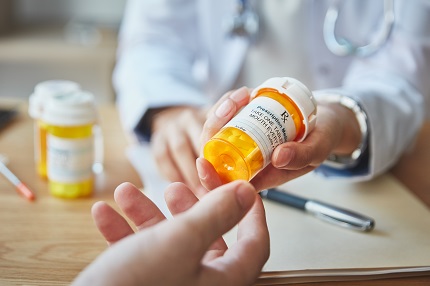From drug coverage stages to drug tiers, Florida Blue is with you to help you understand more about Medicare Part D prescription drug plans before choosing one.
Medicare Part D is the part of Medicare that offers prescription drug benefits.
Medicare Part D covers drugs not included in Original Medicare (Parts A and B).
Medicare Advantage Plans, sometimes called “Part C” or “MA Plans,” are offered by Medicare-approved private companies like Florida Blue. These companies offer standalone prescription drug coverage called prescription drug plans (PDPs) or Medicare Advantage Plans (MAPDs).
If you join a standalone PDP, Original Medicare would provide your Part A and Part B medical coverage. However, if you join a MAPD, you’ll still have Medicare but you’ll get most of your medical coverage from your Medicare Advantage plan.
Medicare decides which drugs are covered under your medical (Part B) or pharmacy (Part D) benefits. The drugs covered by a Medicare Part D plan can be found in each plan’s formulary list of covered drugs.
What’s the difference between Medicare Part B and Part D drugs?
• Part B drugs are covered under your medical benefit. Part B typically covers medications you would get in the hospital (outpatient setting) or at a doctor’s office. Part B also covers drugs used with an item of durable medical equipment, like insulin given via pump. You’ll typically pay 20% of the cost for these drugs.
• Part D drugs are covered under your pharmacy benefit. Part D typically covers prescription drugs you take at home. How much you’ll pay for your drugs depends on your plan, what tier the drug is in, and your coverage stage.
Medicare Part D does not cover all drugs available on the market. Due to federal regulation, Medicare does not cover drugs used for weight loss, weight gain, fertility, hair growth, or sexual dysfunction. You’ll want to check the formulary of a plan to ensure that your prescription drugs are included and covered.
Drugs are sorted into tiers (levels) so the most effective and least costly medicines are used first. This helps make your medications more affordable. Your drugs will cost different amounts depending on what tier they’re in.
Each Part D plan can divide their tiers in different ways. Generally, prescription drugs in higher tiers are associated with higher costs (like copayments and coinsurance) than drugs in lower tiers.
If you don’t sign up for a Part D prescription drug plan when you are first eligible, you may have to pay a late enrollment penalty. The late enrollment penalty is an extra amount you will pay with your Part D plan’s monthly premium.
The late enrollment penalty never goes away. Enroll in Medicare Part D prescription drug coverage when you are first eligible. You are eligible for Part D coverage:
- During your Medicare initial enrollment period (the seven-month period around your 65th birthday)
- When you lose creditable drug coverage. Private drug coverage is considered “creditable” if it meets Medicare guidelines. If you lose this coverage, you will need to get Part D coverage within 63 days in a row without creditable coverage. Make sure to bring records about your creditable coverage when you enroll in a Part D plan.
Here are some of the ways Medicare Part D coverage is different than commercial (employer-offered or individual and family) health insurance:
- The Centers for Medicare & Medicaid Services (CMS) determines the general coverage rules for Medicare plans. With Medicare, the amount you pay for a prescription depends on what coverage stage you’re in and what tier the drug is in.
- You may have to get approval (called a coverage determination) for any drugs you take if they’re not on your Medicare plan’s formulary. This includes when you switch from a commercial plan to a Medicare plan within the same company.
- Medicare drug coverage rules are different from commercial plans. Each plan has criteria that must be met to make sure the drug is used appropiately.
